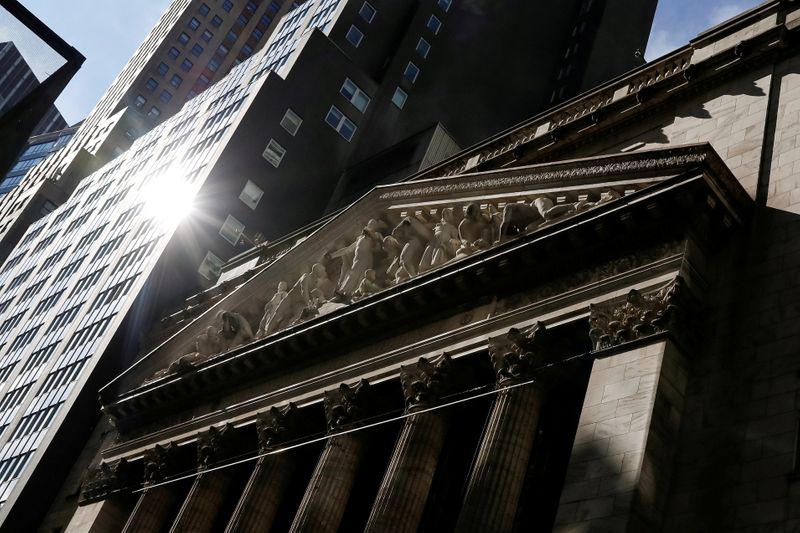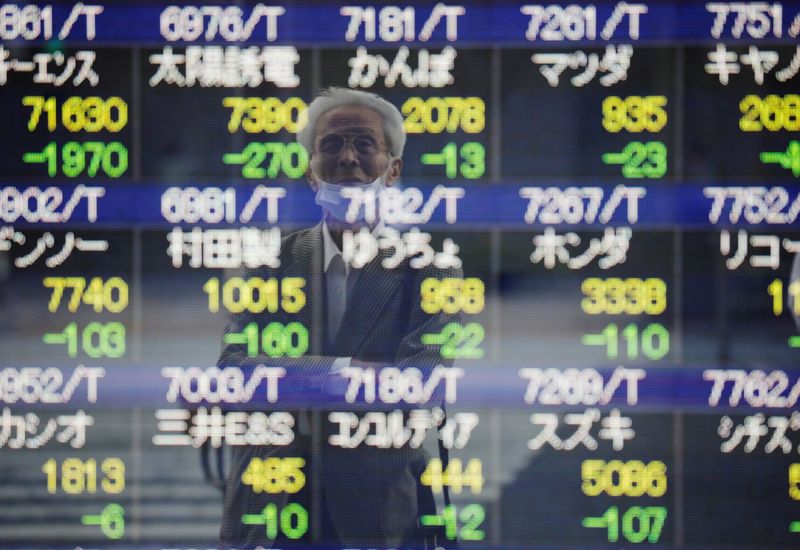By Matt Scuffham
NEW YORK (Reuters) - Global shares bounced in volatile trading on Friday with debate over the timing of future interest rate rises on both sides of the Atlantic intensified by euro zone inflation jumping to a 13-year high.
Earlier in the week, global shares suffered their worst rout since January with major U.S. and European indices feeling the heat. The S&P 500 had its worst month since the onset of the pandemic in September, reflecting concerns about COVID-19, inflation fears and budget wrangling in Washington.
The first day of October, the month for some of history's most infamous market routs, marked a see-saw session with major indices repeatedly switching direction amid investor uncertainty.
MSCI's gauge of stocks across the globe gained 0.45%.
Prior to Friday's rally, the index had been on track for its longest daily losing streak since last February.
Wall Street strengthened as the day progressed, with sentiment boosted by drugmaker Merck announcing progress in the development of an oral COVID-19 drug and rising hopes an infrastructure bill will be passed.
Even so, all three indexes ended lower than last Friday's close, with the S&P 500 and the Nasdaq posting their biggest weekly percentage drops since February.
The Dow Jones Industrial Average rose 483.53 points, or 1.43%, to 34,327.45, the S&P 500 gained 49.55 points, or 1.15%, to 4,357.09 and the Nasdaq Composite added 118.12 points, or 0.82%, to 14,566.70.
In Europe, it was a different picture with the STOXX 600 index falling 0.4%.
"There's clearly still plenty of nerves in the markets at the moment, which is perfectly understandable under the circumstances," said OANDA analyst Craig Erlam.
"There's an enormous amount of uncertainty as we move into the end of the year and central banks removing stimulus, even raising rates, in the midst of that doesn't inspire confidence."
With stellar economic growth figures now in the rear view mirror, markets are looking ugly going into October, Michael Hewson, chief markets analyst at CMC Markets, said.
"There is a sense that, with October's reputation, worries about surging energy prices, supply chain disruptions, concerns about inflation and power shortages, October could be a fairly windy affair," Hewson said.
Consumer price inflation in the 19 countries sharing the euro accelerated to 3.4% year on year in September, from 3% a month earlier, the highest reading since the height of the global financial crisis in September 2008.
"A sharp rise in the cost of living poses a threat to consumers and savers, so that is influencing the mood in the markets," said David Madden, market analyst at Equiti Capital.
So far, central bankers have insisted that rises in inflation are temporary.
"We think there are high chances that this inflation is less transitory than all central banks, including the European Central Bank, are suggesting," BNP Paribas (OTC:BNPQY) economist Luigi Speranza said.
Data overnight showed that Asia's manufacturing activity broadly stagnated in September as signs of slowing Chinese growth weighed on the region's economies, weighing on Asian shares.
Graphic: world stocks and bonds - https://fingfx.thomsonreuters.com/gfx/mkt/xmvjokdkxpr/worldstocks.JPG
DOLLAR, TREASURY YIELDS SLIP
The dollar slipped, having begun the last quarter of 2021 near its highest levels of the year and heading for its best week since June as currency markets braced for U.S. interest rates to rise before those of major peers.
The dollar index fell 0.303%, with the euro up 0.15% to $1.1598.
Gold inched higher, following Thursday's 1.8% surge, as the weaker dollar and worries about rising inflation countered bets for looming interest rate hikes, keeping bullion on course for a small weekly gain.
U.S. gold futures settled up 0.1% at $1,758.4. Spot gold added 0.2% to $1,759.47 an ounce.
Benchmark 10-year notes last rose 17/32 in price to yield 1.4702%, from 1.527% late on Thursday.
Japan's Nikkei tumbled 2.3% to the lowest level since Sept. 3. An MSCI index of Asia-Pacific stocks slid 1.22% to its lowest since Aug. 24.
Chinese markets are closed for a week from Friday for the Golden Week holiday.

Crude prices rose but were still below the $80 a barrel Brent hit earlier in the week for the first time in three years.
U.S. crude oil futures settled at $75.88 per barrel, up 1.1%. Brent crude futures settled at $79.28 per barrel, up 1.2%.
